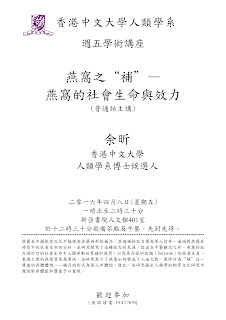Heigui: Prejudice Towards Africans
and Its Implication for a Changing China
Speaker: LIN Dan, Linessa (PhD
Candidate, Department of Anthropology, The Chinese University of Hong Kong)
Time: 1:00 – 2:30 pm, 1 Apr 2016
(Friday)
Venue: Room 401, Humanities
Building, New Asia College, CUHK
Lin Dan, our department PhD
candidate, gave a seminar on “Heigui: Prejudice Towards Africans
and Its Implication for a Changing China” on Apr 1. Lin had been conducting
research on African migrants in China, and she carried out her fieldwork in Guangzhou,
which is a multi-ethic hub for internal and international migrants.
 |
| Linessa |
Lin defined prejudice as
a form of antipathy originates from a faulty and inflexible generalization. She
focused on prejudice against sub-Saharan Africans in China, who are traders,
teachers, students, and housewives. These people were attracted to the country
by its genial visa policy and the renowned reputation of China as a “world
factory”. Guangzhou, in particular, as a hub for cross-border trade, attracted
a lot of Africans and Arab traders.
Despite the fact that
some Africans had high school degree and a middle class background, they had
been prejudiced in China as cheaters, criminals, law breakers, drug dealers,
rapists, overstayers, and uneducated and destitute people. Many Chinese also
regarded marrying Africans as a type of marry down. These negative perceptions
were often created out of miscommunication and faulty imagination.
As Lin mentioned, the
prejudice against Africans was partly a consequence of Chinese limited
knowledge of Africa, Africans and African cultures. The negative reports on
Africans disseminated by the mass media also influenced people simultaneously. In
addition, Lin talked about the discourse of skin colour (that yellow skin is
more superior than black skin, and black represents negative characters like
laziness) which had been frequently used by the Chinese to draw boundaries
among nationalities. Many Chinese also stuck to the historical impression that
China gave aids to Africa, without realizing the progress that Africa had gone
through.
 |
| Seminar attendees |
Lin, towards the end of
the seminar, discussed the uncertain future of the dynamics between Chinese and
the Africans in China. China may develop into an immigrant society with
foreigners residing in the country whereas Chinese going overseas. It is also
possible that the increasingly strict control of Chinese government and its
unclear residential policies for foreigners, in addition to the lack of
knowledge of African cultures and miscommunication in the society, will lead to
the loss of Africans in the country.








